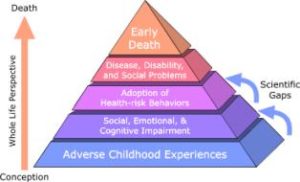As with any disease, conflict, or endeavor, it is not enough to meet the challenges head-on–we must be a step ahead of the issue; we must be upstream, investigating the root causes of the issue. WCASA’s mission to end sexual violence is indicative of the importance prevention is in our work.
For information on training, technical assistance or resources related to prevention, contact Angie Rehling, Prevention Coordinator. We also invite you to join the conversation on the prevention listserv.
WCASA Prevention Efforts
 Forward Wisconsin: A Plan for the Prevention of Sexual Violence
Forward Wisconsin: A Plan for the Prevention of Sexual Violence
In 2009, representatives from the Wisconsin Departments of Health Services, and Children and Families, the Wisconsin Coalition Against Sexual Assault, the Wisconsin Coalition Against Domestic Violence, the Governor’s Council on Domestic Abuse, the Wisconsin Children’s Trust Fund, the Child Abuse Prevention Fund of Children’s Hospital and Health System, and Children’s Service Society of Wisconsin joined in a collaboration. They created a statewide initiative to increase the implementation of prevention strategies at state and local levels.
The plan focuses on six areas and works to enhance efforts to change social norms and community tolerance for violence. Bound together by research and practice demonstrating the links between child maltreatment, sexual assault, domestic violence, and elder abuse, the Forward Wisconsin Initiative strives to become a force to:
- change social norms that perpetuate violence;
- create systems, structures, laws, policies and standards to promote and facilitate respectful communities and society;
- cultivate peaceful and supported individuals and communities.

| Gender Socialization | Objectification & Sexualization | Normalization of Violence & Power | Limited Concepts of Health & Sexuality |
|---|---|---|---|
| Norms that support male superiority | Norms that support male sexual entitlement | Gender tolerance of sexual violence | Systems that limit access to reproductive health services &choice |
| Norms that maintain female inferiority | Norms that maintain female sexual submissiveness | Lack of positive models for conflict resolution & discipline | Sexual entitlement & cultural misperceptions about consent |
| Homophobic of gender-based harassment & discrimination | Exploitation through pornography, prostitution & trafficking | Acceptance of violence over systemically - oppressed groups | Limited age-appropriate scientific-based education on sexuality |
| Rigid gender roles and expectations | Culture of hyper-sexualization | Culture that glorifies violence | Lack of support for autonomy & power to make decisions about one's body |
Each year, WCASA addresses a different social norm in more depth. Look for information in specific posts on social media, within WCASA trainings, and in resources on WCASA listservs. Additionally, we have developed resources for each norm that includes information, research, resources and activities to support programs who want to discuss these norms in their schools, groups or communities.
Download the one page Social Norms Toolkit Summary.
Also see the Center's for Disease Control (CDC)'s social norm page.
10 Core Concepts to Prevent Child Sexual Abuse
A collaboration between the Wisconsin Coalition Against Sexual Assault and state-level agencies led to the development of 10 Core Concepts to Prevent Child Sexual Abuse (CSA). These partners, brought together through the A2A Steering Committee (see below), identified these concepts through a review of best practices for CSA prevention, as well as research on to prevent victimization and perpetration across childhood and adolescence.
Further development of this framework will include the identification of strategies to address each concept at multiple levels (Individual; Parent/Guardian; Schools; Systems/Community) and for a variety of age groups (Birth – 5; Elementary; Middle School; High School; College). For more information about these resources, please contact Kelly Moe Litke, Associate Director.
10 Core Concepts for CSA Prevention
| Sexual Health & Development | Gender Socialization | Intersections of Oppression | Boundaries & Consent | Empowerment & Body Ownership |
|---|---|---|---|---|
| Pro-Social Behavior & Skills | Understanding, Identifying & Responding to Trauma | Bystander Intervention | Information about Sexual Abuse | Safety & Risk Reduction |
- Download a PDF of the Core Concepts
- Download a PDF of the Core Concepts & Research
- 10 Core Concepts Presentation from National Sexual Assault Conference (NSAC) - This workshop was part of the Prevention Track at the 2015 National Sexual Assault Conference that held September 2 – 4 in Los Angeles, CA. In this session Kelly Moe Litke and Rose Hennessy review the concepts, research, and recommendations for implementation.
Consent Is… Toolkit
 This toolkit was created through a collaborative effort with Wisconsin youth, sexual assault and domestic violence preventionists, and adolescent health experts. It contains resources for educating and talking about consent with children through young adult audiences, as well as materials for hosting a “Consent is…” campaign in your community.
This toolkit was created through a collaborative effort with Wisconsin youth, sexual assault and domestic violence preventionists, and adolescent health experts. It contains resources for educating and talking about consent with children through young adult audiences, as well as materials for hosting a “Consent is…” campaign in your community.
Rape Prevention & Education (RPE) Program
Established in 1994 as a part of the Violence Against Women Act (VAWA), the RPE Program is implemented by the Centers for Disease Control and Prevention (CDC) and operates in all 50 states, the District of Columbia, Puerto Rico and four U.S. Territories. For more information see Center for Disease Control (CDC) RPE background information and the Rape Prevention Education Program Factsheet (NSVRC)
In Wisconsin, RPE funds are administered by the Department of Health Services (DHS), through the Injury/Violence Prevention Program. For more information see the sexual violence prevention page at the Wisconsin DHS.
Online Training
You can access a variety of prevention trainings that have been offered by WCASA via YouTube or access the webinar archive for these and other archived webinar topics:
- Zooming In: Poetry as an Entry Point into Violence Prevention Work (WCASA, 2018)
- The Sexual Assault to Prison Pipeline: Realities & Recommendations (WCASA, 2018)
- Teaching Good Sex: A Method for Violence Prevention (WCASA, 2017)
- Pornography: Normalizing the Relationship Between Violence and Sex (WCASA, 2017)
- Integrating an Anti-Oppression Approach in SV Prevention (WCASA, 2017)
- Gender Socialization & Sexual Violence (WCASA, 2017)
- Introduction to Prevention (WCASA, 2016)
- Involving Teens in Prevention Work: Educating, Engaging & Empowering Youth Leaders (WCASA, 2016)
- Moving Pictures: Using Narrative Film and Television in Sexual Violence Prevention (WCASA, 2016)
- Working Around The Gate Keepers: Unorthodox Approaches to Community Engagement (WCASA, 2016)
- Adapting curriculum to be LGBTQ+ inclusive (WCASA, 2016)
- Using Social Media Effectively (WCASA, 2016)
- Normalization of Violence (WCASA, 2015)
- Prevention (WCASA, 2015)
- Strategies for Ending Rape Culture and Sexual Violence (WCASA, 2015)
- Introduction to Evaluation (WCASA, 2013)
- Intersectionality with Oppression (WCASA, 2013)
- Adverse Childhood Experiences (ACE) (WCASA, 2013)
- Integrating Prevention & Classroom Tips for Different Age Groups (WCASA, 2013)
- Community and Societal Level Interventions in Prevention (WCASA, 2013)
Collaborative Prevention Projects
A complex social problem, sexual violence requires a collaborative approach to prevention. WCASA collaborates with partners from state and local levels on initiatives related to sexual violence prevention.
Adverse Childhood Experiences (ACE):

The Adverse Childhood Experiences (ACE) Study is one of the largest investigations ever conducted to assess associations between childhood maltreatment – including sexual abuse – and long-term health outcomes. The original study was conducted in the mid-90s in California; WCASA has been collaborating at the state level with a variety of partners to better understand the impact of ACEs in Wisconsin. See more info about ACEs in Wisconsin:
Awareness to Action (A2A) Steering Committee:
A2A is an initiative focused on prevention child sexual abuse by helping adults and communities take action. As a member of the A2A Steering Committee, WCASA works with Children’s Hospital (and others) on education and policy. This initiative is a program of Children’s Hospital of Wisconsin. See more information.

Social Norms & Risk Factors
Social norms are the attitudes, values, and beliefs that exist in our culture that contribute to sexual violence. Beginning in 2014, WCASA staff reviewed research and contacted experts to identify risk factors that are relevant and timely for sexual assault prevention in Wisconsin. This led to the identification of social norms and risk factors. Recognizing that systems of oppression reinforce these norms, we aim to address the ways privilege, power, and entitlement contribute to all of the norms.